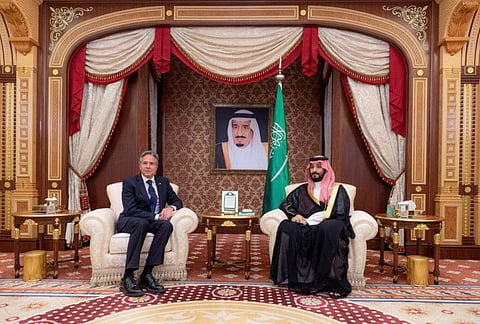Saudi crown prince, Blinken had ‘candid’ talks in Jeddah: US official
Discuss potential for normalisation of ties with Israel, Sudan crisis and Yemen

JEDDAH: US Secretary of State Antony Blinken had an “open, candid” conversation with Saudi Crown Prince Mohammad bin Salman in the early hours of Wednesday about a wide range of bilateral issues, a US official said.
The top US diplomat arrived in Saudi Arabia late on Tuesday for a much anticipated visit amid frayed ties due to deepening disagreements on everything from Iran policy to regional security issues and oil prices.
Also Read: Saudi-US meeting to focus on boosting ties
Also Read: Saudi-US ties must return to normality
Blinken’s visit came days after top crude exporter Saudi Arabia pledged to deepen oil output cuts on top of a broader OPEC+ deal to limit supply, as it seeks to boost flagging oil prices despite opposition from the US administration.
Blinken and the crown prince met for an hour and forty minutes, a US official said, covering topics including Israel, the conflict in Yemen, unrest in Sudan as well as human rights.
“There was a good degree of convergence on potential initiatives where we share the same interests, while also recognising where we have differences,” the US official said.
A good part of the discussion was expected to be dominated by the possible normalisation of ties between Saudi Arabia and Israel, even though officials had played down the likelihood of any immediate or major progress on the issue.
“They discussed the potential for normalisation of relations with Israel and agreed to continued dialogue on the issue,” the US official said, without providing further details.
Saudi Arabia gave its blessing to Gulf neighbours United Arab Emirates and Bahrain establishing relations with Israel in 2020 under the previous US administration of Donald Trump.
Riyadh has not followed suit, saying Palestinian statehood goals should be addressed first. In April, Saudi Arabia restored ties with Iran.
NUCLEAR TECHNOLOGY
Developing a civilian nuclear programme is among Riyadh’s conditions for normalising ties with Israel, a source familiar with the discussions said, confirming a New York Times report from March. Saudi or US officials have not publicly confirmed that.
However US officials have said in the past they would share nuclear power technology only if the agreement prevents enrichment of uranium or reprocessing of plutonium made in reactors - two routes to making nuclear weapons.
Riyadh has also leveraged its growing relationship with China as Washington pushed back against some of its demands including lifting restrictions on arms sales and help with sensitive high-tech industries.
Two days after Blinken’s visit, Riyadh will host a major Arab-Chinese investment conference.
Jonathan Fulton, non-resident senior fellow at Atlantic Council, said China would help the Saudis in sectors where the US won’t but the relationship between Riyadh and Beijing did not have the same depth as with Washington.
“At this point I’d still characterise the US-Saudi relationship as strategic and the China-Saudi relationship as transactional,” Fulton said.
Hours before departing for Saudi Arabia, at a speech in Washington, Blinken said the United States had a “real national security interest” in advocating for normalising Saudi-Israeli ties but cautioned about the time frame.
“We have no illusions that this can be done quickly or easily,” Blinken said.
Mohammad Bin Salman also discussed Yemen and potential ways to resolve remaining issues, while Blinken thanked the crown prince for the kingdom’s role in pushing for a ceasefire in Sudan and helping evacuate US citizens.
Sign up for the Daily Briefing
Get the latest news and updates straight to your inbox



